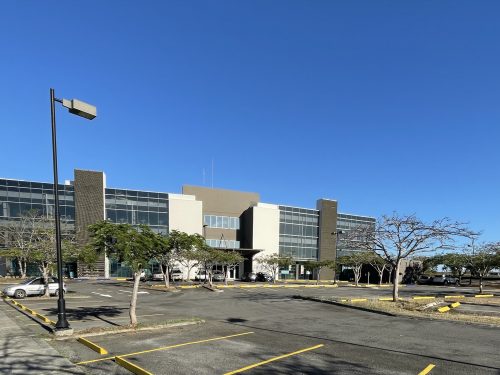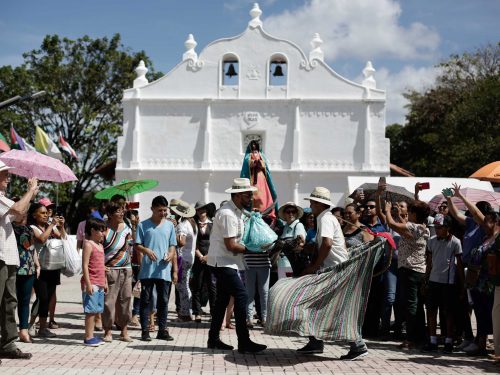
In the room, there is a speaker playing reggaeton and a phone with the volume all the way up playing cumbia that set the scattered conversations to music. At the long table covered with plastic, several people scoop the insides out of jicaros with tablespoons. It is easier for some than for others, but by the end of this week they must have 30 jicaros dried out, carved and painted in the form of lanterns to fulfill the first contract that they have signed as an association.
We are in the hall of the Nicoyan Association of People with Disabilities (Asoniped), which seeks to help people like them integrate into society and achieve, in one way or another, independence. This first contract was made with a state institution (Senara), and they hope to find similar ones.
Meanwhile, their mothers, aunts and sisters are usually the caregivers who are on the other side, wrapping tamales at full speed to sell to raise funds for the association.
They come here every day from Monday to Friday, and it doesn’t matter if they are in music, hydrotherapy, or crafts classes, there is something in the scene that does not change: a female face taking close care of them.

Katthy Madrigal (center), 37, works with her mother selling food outside of the Ebais clinic in Hojancha. Together with other women in the support group, they look for different ways to finance the association, for example, selling tamales.Photo: César Arroyo

Maria Alejandra Obando works on one of the 30 lanterns that Senara (National Service of Underground Water, Irrigation and Drainage) commissioned Asoniped to decorate for its facilities during the month of September.

Sinem gives music lessons once a week to several Asoniped members like Vìctor Oconor, 52 years old (left), and Jaime Fonseca, 25 years old (right), at the Nicoya House of Culture.Photo: César Arroyo
According to the 2018 Survey about Disabilities by the National Institute of Statistics and Census (INEC), 70% of the people who provide assistance to this population are women. In Asoniped, many lack resources and have to travel long distances to take them to medical appointments or classes.
This job, which in itself is difficult, is further complicated because, according to the same survey, 90% of these people do not receive any payment for it.
The limitations do not stop them because they say they have seen how the workshops have given vitality back to those who attend, it gives them a reason to leave their homes and to feel that they have companionship.

“One would like their children to be integrated into society,” says Haydee Molina, a nurse on the night shift at La Annexation Hospital in Nicoya. Before going to bed, she prepares breakfast for her 37-year-old daughter Yeritza Cyrus and helps her get ready to go to the Asoniped workshops.

Jerson Castillo Aguilar, 22, participates in a field practice session for the first aid course he takes at INA. Jerson is part of Asoniped, Sinem and Special Olympics. He trains every day after the INA course, swimming for three hours.

When Caleb, his three-year-old nephew, wakes up in the morning, he looks for German to prepare his bottle. German lives with his sister Tamara since his father died seven years ago, and now with his nephew also.Photo: César Arroyo
Behind the hall, a small field grows with corn, squash and other vegetables that they have planted themselves. Inside, in a storage area, there are dozens of handicrafts made with recycled material from previous workshops.
Around the work tables, arranged across the corridor, there are those who struggle to live a more dignified and independent life. Very close to them, there are strong women observing, making sure they can build that future.

“It’s been hard because it’s hard to be the head of three people, and he can’t do the same things as me and he can’t worry about the same things that I worry about. So it’s much harder because it’s like having two children. Sometimes things don’t turn out well and that frustrates me,” says 25-year-old Tamara Rodriguez.Photo: César Arroyo







Comments